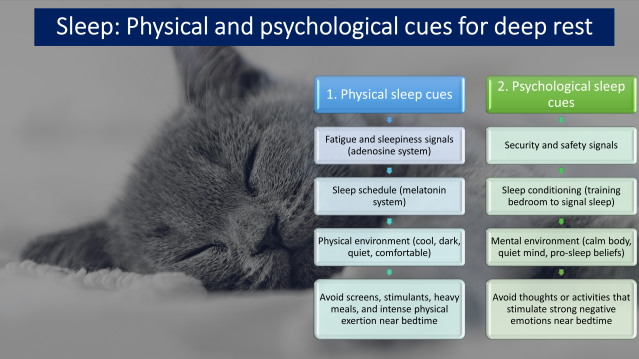SLEEP- The Two-System Formula for a Better Night's Sleep. Why good rest requires more than medicine. Reviewed by Lybi Ma

KEY POINTS-
- Sleep problems remain at all-time highs in the U.S. despite a plethora of treatments.
- Sleep is a complex system comprised of physical and psychological dimensions.
- Most sleep treatments address only physical sleep characteristics.
- The best sleep treatments, like CBT-i, address both physical and psychology dimensions.

Sleep is a rare activity that gets harder in adulthood. While we've usually mastered the struggles involved with tying our shoes, learning the multiplication tables, and even driving a vehicle by the end of adolescence, sleep habits frequently decline across the same age span. By the time we're adults—whether measured in terms of sleep hours, sleep quality, rates of sleep disorders, or percentages taking sleep medicines—regular, restful sleep is more elusive than during our youth1.
On the surface, this pattern seems counterintuitive. Compared to children, for instance, adults are more knowledgeable about the importance of sleep, have more control over their sleep schedules, and have access to many more FDA-approved sleep medicines and evidence-based sleep treatments. Yet despite these apparent advantages, more than 50 million U.S. adults suffer from chronic sleep disorders.2 Worse, common remedies such as sleep hygiene techniques, over-the-counter sleep treatments such as melatonin, and even most prescription sleep medicines show little to no efficacy in clinical trials.3-4 Why does a simple night's sleep become so complicated as we mature?
Sleep physiology and sleep psychology
One answer to the adult sleep paradox appears to be the increased role of sleep psychology factors as we age. As shown in the figure below, sleep results from two interdependent systems. First, there is the physiological sleep system. This system depends on cyclical biological mechanisms such as adenosine and melatonin levels to regulate the body's state of sleepiness and daily sleep schedule. When doctors recommend sleep hygiene practices, melatonin, or prescribe sleep medicines, consider that they usually target only the physiological sleep system.

But what happens when the person's sleep deficit isn't resulting from problems with their physiological sleep system? Continued poor sleep, as millions of adults can personally attest.
The above situation, frequent poor sleep despite medication-hygiene treatment, is where the psychological sleep system becomes especially important to address. No matter how physiologically prepared a person is for sleep, unless their sleep psychology system is permissive, sleep will remain difficult. Perhaps even impossible. Negative thoughts and emotions, for example, can prevent sleep even in a person physically exhausted from their day's labor. In these cases, no amount of sleep hygiene or sleep medicine may help until the person can improve the state of their sleep psychology system.
The underappreciated but critical importance of this sleep psychology system explains why cognitive behavioral therapy for insomnia (CBT-i) can be so effective for people otherwise struggling with years of treatment-resistant insomnia.5 Unlike conventional sleep hygiene and sleep medicines, CBT-i is designed to assist a person with both their physiological and psychological sleep systems. If you are one of the many people experiencing chronic sleep difficulties despite numerous conventional treatment efforts, consider that your solution may require refocusing your efforts on the psychological system factors that less visibly but just as potently influence your sleep habits.
Summary
According to sleep experts, the act of sleeping is comparable to the process of landing an airplane. Here's how:
- Both sleep and landing a plane require preparation steps; you can't simply drop into them.
- Both involve a combination of mechanical operations (landing gear and flaps for an airplane, for example, versus sufficient adenosine and melatonin levels for sleep) and psychological processes (for example, pilots trained to read weather conditions and make real-time adjustments to procedures versus people trained to perform cognitive, behavioral, and emotional steps conducive to sleep).
- Both effective sleep and successful airplane landings require the precise coordination of the latter two systems. Engaging one system without the other usually leads to disappointing or even disastrous results.
Now that you appreciate the distinct physiological and psychological dimension at work behind your sleep patterns, can you spot the weak point in your sleep system? The hope is that you're now better positioned to refine your treatment efforts and discuss personalized sleep treatment programs with your healthcare providers.
- Questions and Answers
- Opinion
- Motivational and Inspiring Story
- Technology
- Live and Let live
- Focus
- Geopolitics
- Military-Arms/Equipment
- Güvenlik
- Economy
- Beasts of Nations
- Machine Tools-The “Mother Industry”
- Art
- Causes
- Crafts
- Dance
- Drinks
- Film/Movie
- Fitness
- Food
- Oyunlar
- Gardening
- Health
- Home
- Literature
- Music
- Networking
- Other
- Party
- Religion
- Shopping
- Sports
- Theater
- Health and Wellness
- News
- Culture

